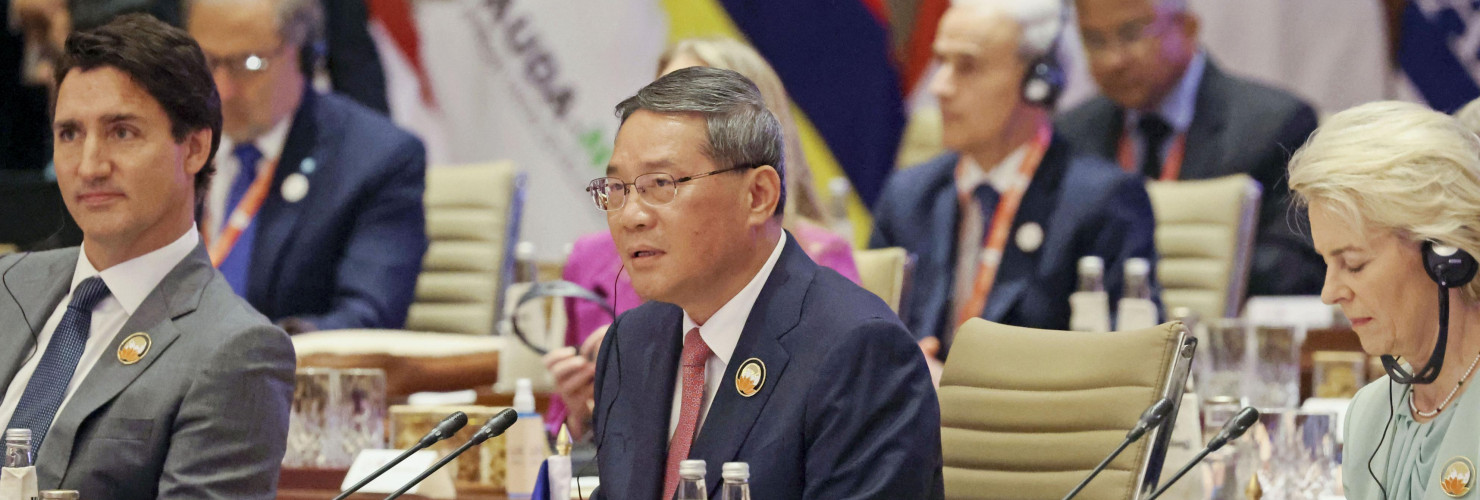

The EU's agenda on China for the months ahead + New Asia Director at EEAS
Analysis
Back to school for EU leaders
After the summer recess, it is high time to set a new EU agenda on China and reengage its leaders. Prior to her State of the Union speech, Commission President Ursula von der Leyen had already met China’s Premier Li Qiang on the margins of the G20, and so too had Council President Charles Michel met with his Chinese counterpart. Beijing is set to see European leaders come and go in preparation for the end-of-year EU-China Summit.
Von der Leyen’s State of the Union speech declared the EU is back to school and China is top of the agenda. The Commission work plan is set for the upcoming year: Europe will de-risk but not decouple from China, through the rollout of its economic security strategy. Resilience of EU supply chains will drive the Union’s legislative agenda. Europe will also strengthen its competitiveness and address China’s unfair practices. In that regard, the Commission announced the launch of an anti-subsidies investigation of the influx of China’s cheaper electric vehicles into Europe.
China needs Europe and Europe needs China
Europeans have welcomed China’s interest to engage and have an interest themselves in ensuring that channels of communication with China remain open, that too is part of the EU‘s de-risking agenda. The G20 was an increasingly rare opportunity to meet with Premier Li Qiang and particularly precious in the face of Xi and him likely leaving the UN General Assembly to third in command Vice President Han Zheng.
At the G20, Michel and von der Leyen not only had separate meetings but also decided to focus on separate agendas. Michel focused on the bilateral aspects, announcing a summit by the end of the year, while von der Leyen covered global challenges. More in-depth discussions on the bilateral agenda will take place at the EU-China High Level Economic Dialogue (HLED) in Beijing, led on the European side by Commission Vice President Dombrovskis on September 25, and the EU-China Strategic Dialogue when HR/VP Josep Borrell finally makes his previously postponed China trip to Shanghai and Beijing from October 11 until 16.
The High Level Digital Dialogue with Vera Jourova, Vice-President for Values and Transparency, and Vice-Premier of China, Zhang Guoqing, took place on September 18 adding to the preparation for the next EU China Summit, which should be held before the end of the year as announced by both President of the Commission and of the Council earlier in September.
While the EU is rolling up its sleeves for the last round of high-level interactions with China before the European elections next year, ministers and high-ranking officials from France, Italy, Denmark and Germany are also visiting China or holding high level dialogues at home, testing the waters for the months to come and articulating national priorities in relation to China that would also shape the EU agenda.
Europeans to Beijing
Italian Foreign Minister and Deputy Prime Minister Antonio Tajani were equally busy reassuring Beijing that economic and political relations are stable, consistent, and would not be affected by a “BRIxit.” While he did not travel to China to deliver a decision on whether Italy would exit China’s signature Belt and Road Initiative, he nonetheless prepared the ground and engaged in damage control.
PRC Foreign Minister Wang Yi, steadfast in the face of the ongoing purge of the top leadership in China, appeared unperturbed and welcomed his Italian counterpart, stressing the long-standing relationship between the two countries. Italy and China may have reached a silent agreement that this is the best way to save both face and trade.
In a delicate balancing act, the UK also carefully reengaged with China. After five years of difficult bilateral relations, the visit of Foreign Secretary James Cleverly sends a signal that relations are resuming with a re-establishment of contacts at the top level. Nonetheless, the UK remains on the back foot on economic matters.
China is ready for more: As clearly stated in the Chinese readout of the meeting, Beijing expects to cooperate with the UK on economic, scientific and political matters. Given the mood in Westminster these days with espionage accusations and the question of China’s influence back on the top of the agenda, there is doubt about a strong political appetite for fostering cooperation.
Russia’s aggression against Ukraine, stability in the Taiwan Strait and human rights violations
British Prime Minister Rishi Sunak managed to organize a meeting with Li Qiang as well on the sidelines of the G20 and came to talk about Chinese interference in British democracy and politics, something that likely didn’t go down well on the Chinese side. Readouts of both meetings call on the UK and China to mutually respect each other, remove obstacles in their relationship and properly handle differences. This is code to steer clear of controversial topics.
Remaining core issues
It is common for European leaders who meet with Chinese counterparts to address how China’s position in the war in Ukraine will affect bilateral relations in the long run. Nonetheless, European leaders are still confronted with a Chinese leadership that does not or does not want to grasp that Ukraine is a priority for Europe in its home and foreign policy, and that all other issues are being looked at through that lens.
The watered-down language of the G20 summit communique on Ukraine did not support Europe’s stance that a long lasting and just peace in Ukraine is Europe’s priority. Similarly, Danish Foreign Minister Lars Lokke Rasmussen’s call for China to speak up on Russia fell on deaf ears during his August visit to China. In the end, renewable energy cooperation and climate coordination were the only tangible outcomes of his trip.
Important months ahead
It is time for a coherent and orderly reengagement with the Chinese leadership in view of delivering concrete results at the EU China Summit at the end of the year. This is an ambitious program to bring the term of this geopolitical Commission to a close, which will slowly enter a phase of transition and elections. Let’s take stock of the EU’s capacity to deliver in the next months. Bilateral meetings with member states so far rather point to an underdelivering of de-risking than overshooting towards decoupling, setting the focus rather on competitiveness and industry over specific economic risks.
In this phase of reengagement, China is also emerging from a tumultuous summer which may well continue into the autumn. The absence of President Xi Jinping at the G20 and at the upcoming UN General Assembly is noteworthy, giving space for Prime Minister Modi to shine and for partners to sign up to the India-Middle East Corridor.
Beijing’s domestic issues have sidetracked its foreign diplomacy, shown by Xi preferring to tour Heilongjiang and prioritize Chinese farmers rather than attend the G20 and UN General Assembly to strengthen the Global South’s favor towards China. If he also misses out on the November APEC summit in San Francisco, it would be another sign that things at home are bad.
At the same time, there is shaky turnover inside the government, Foreign Minister Qin Gang’s diplomacy-dragging disappearance and Defense Minister Li Shangfu’s absence mean managing external relations remains tough. The world is keen to engage with China, but the pre-conditions are clear: there needs to be a credible counterpart and many times that means a President that travels abroad to meetings.
Read more:
- Euractiv: Italian Foreign minister Antonio Tajani visits China as country’s participation in Belt and Road Initiative hangs in balance
- The Guardian: Isolating China would be a mistake, says UK foreign secretary
- Chinese MFA on Rasmussen visit: 韩正会见丹麦外交大臣拉斯穆森 (EN: Han Zheng met with Danish Foreign Minister Rasmussen)
- European Council: Readout of the meeting between President Charles Michel and China's Premier Li Qiang
Update
Habemus Asia Director
The EU’s diplomatic arm, the European External Action Service (EEAS), has selected the person to succeed Gunnar Wiegand as Asia Director. The privilege has been entrusted to Niclas Kvarnström, the Head of Department for Asia and the Pacific at the Swedish Ministry for Foreign Affairs.
What you need to know:
- Expertise on Asia: Before leading the Department for Asia and the Pacific, between 2018 and 2021, Kvarnström, was Sweden’s Ambassador to Singapore. In 2012, he briefly held the position of Deputy Director at the Department for Eastern Europe and Central Asia, which he then held again between 2016 and 2018.
- China background: He graduated from Oxford in China studies and joined the China desk at the Swedish Ministry of Foreign Affairs in 2001, and then served as First Secretary at the Swedish Embassy in Beijing (2002-2005).
Quick take: Kvarnström’s China background was likely the deciding factor that gave him the edge over the other candidates, granting him the position. Diplomats are often generalists by training but having someone with both the needed language skills and direct in-country experience are important assets for EEAS. The growing importance of China for the EU’s foreign policy and the challenges the bilateral relationship pose mean that the EU can only benefit from the new Asia Director’s expertise.
Read more:
- South China Morning Post: European Union set to name Swedish diplomat Niclas Kvarnström as new Asia Pacific chief
- Table China: Niclas Kvarnstrom – new Asia director at EEAS
Short takes
The EU released its yearly reports on developments in Macao and Hong Kong
As part of its commitment to the European Parliament to monitor the implementation of “One Country Two Systems” in Hong Kong and Macao, EEAS released its annual reports on the situation in both regions. As in the previous year, the reports emphasize a deterioration of democratic practice and autonomy with an advancing erosion of political and civil rights as well as fundamental freedoms, notably freedom of the press. At the same time, the report highlights that EU bilateral trade in services with Hong Kong grew by 25.1 percent in 2022 and that commercial links between the EU and Hong Kong remain substantial. In Macao, a similar story over national security is unfolding. At the same time, the EU became Macao’s largest trading partner in goods in 2022.
-
European Commission: Hong Kong: Annual EU report
-
European Commission: Macao: EU report
With export controls looming, China hoards Dutch ASML chipmaking equipment
On September 1 this year, the new regulations on export controls of certain semiconductor equipment have entered effect in the Netherlands. In a joint effort with the US and Japan, this regulation, which introduces prior license requirements for advanced chip manufacturing technology, aims to prevent China from acquiring sensitive technology. ASML was automatically granted the necessary licenses for its operations until the end of the year, which means that the company did not see the need to review its financial outlook for the year. Making use of that opportunity, Chinese imports of chip production equipment increased by nearly 70 percent year on year for June and July 2023.
- Financial Times: China imports record amount of chipmaking equipment
- Politico: Dutch cozy up to US with controls on exporting microchip kit to China
Trading pawns at the India G20 summit
President Xi Jinping was the big absence at this G20 Summit, delegating the world leaders’ showcase to his Premier Li Qiang and leaving the spotlight for India’s Prime Minister Narendra Modi to shine. India’s initiative, the new India-Middle East-Europe-Corridor (IMEC) tries hard to look like an Indian variant of China’s Belt and Road Initiative. With several challenges ahead and a clear timeline to come only in the next 60 days, IMEC is an agile collective response to China’s global ambitions in the context of increasing geoeconomic competition.
- Hindustan Times: Shifting global dynamics through new trade corridor
- Lowy Institute: India pushes China to the margins of the G20
Ukraine considers restricting use of Chinese providers for the reconstruction of its mobile network
The reconstruction of Ukraine is in the heads and wallets of all European (and non-European) governments. How will Ukraine handle the role of China in rebuilding its critical infrastructure? Kyiv is facing a dilemma in rebuilding its destroyed digital infrastructure: Some Ukrainian network providers rely on Chinese firms for up to 70 percent of their network equipment. In August 2023, the largest network provider Kyivstar signed a deal with Huawei and ZTE for over USD 600 million for the reconstruction of its networks. At the same time, the National Security and Defense Council started discussing a ban of Chinese network components for government networks, citing national security concerns. While there is no final decision, restrictions on Huawei and ZTE would come at a price that Kyiv and other Western countries might be reluctant to pay.
- Politico: Ukraine walks telecoms tightrope between China and the West
- Interfax: У РНБО обговорюють можливість відмови від китайського телеком-обладнання (EN: The National Security and Defense Council discusses the possibility of abandoning Chinese telecom equipment)
The German university of Erlangen-Nürnberg rushes ahead in excluding Chinese PhD students with PRC government scholarships
This is a first among German and European Universities: Chinese PhD Students with a scholarship funded by the China Scholarship Council (CSC) will no longer be admitted to the university’s PhD program. This decision was taken following concerns about forced research and knowledge transfer as well as industrial espionage. Enrolled students will not be affected by the new regulations, neither will students with an additional scholarship from a German institution be denied from studying. The German government backed this decision. This rather small-scale decision will most likely affect only a few dozen researchers. It could however pave the way for broader exclusions and similar decisions to be taken in other universities in Germany and Europe.


